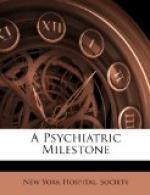It is proposed that the new asylum should be placed a few miles from the city. The visitors to it, (I do not mean the medical ones) will, I presume, be residents in New-York, and from what I have seen of the zeal of persons under such appointments in this country, it appears desirable, to render the performance of this duty, so important for the welfare of asylums, as easy as it can be with propriety. One mile perhaps would not be objectionable, and might probably afford as good air and retirement, as a greater distance.
I need hardly say, I was much gratified to find by the pamphlet, that the importance of moral treatment in the cure of insanity, was duly appreciated in America. When we consider, as Lord Bacon observes, speaking of common diseases, that “all wise physicians in the prescription, of their regimen to their patients, do ever consider accidentia animi, as of great force to further or hinder remedies or recoveries;” it is difficult to account for the general neglect of moral considerations in the treatment of deranged mind. I hope, however, though in many instances medicine may not be employed with advantage, and its indiscriminate use has been seriously injurious, that we shall not abandon it as altogether useless, in what we term disease of the mind. All the varieties, included under this general term, have been produced by physical causes: by external accidents, by intoxication, the improper use of medicines, repelled eruptions, obstructed secretions, &c. In some instances, dissection has discovered, after death, the cause of the mental affection, and though, in many instances, no physical cause can be detected, yet, when it is considered, how limited are the investigations of the anatomist, and that the art is so imperfect, that diseases occasioning instant death, cannot always be discovered on the most minute dissection, it is not unreasonable to suppose, that the body is in all cases the true seat of the disease.
All I would infer from this speculation is, the importance of having judicious medical attendants, to watch the progress of the disorder, to be ready to apply their art as bodily symptoms may arise, and to ascertain, with greater precision than has hitherto been done, “how and how far the humours and effects of the body, do alter and work upon the mind; and how far the passions and apprehensions of the mind, do alter and work upon the body.” Even if the disease is not confined to the corporal organs of mind, but extends to the pure and eternal intelligence, medical aid may still be useful from the well known reciprocal action of the two parts of our system upon each other.




